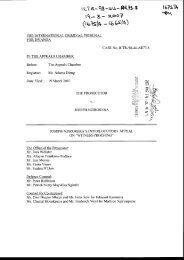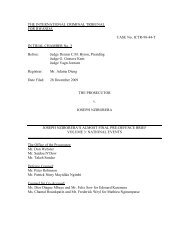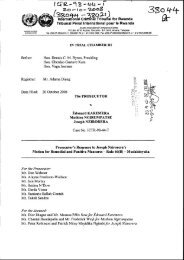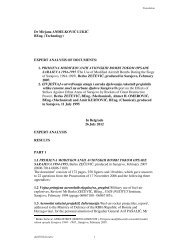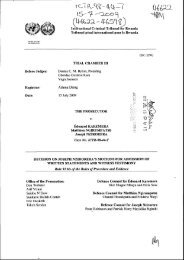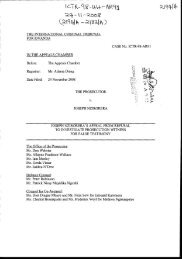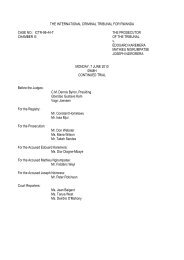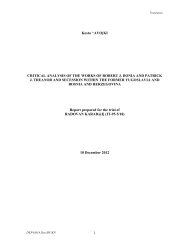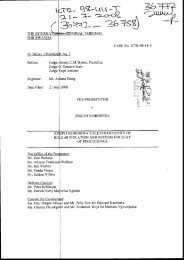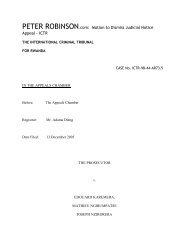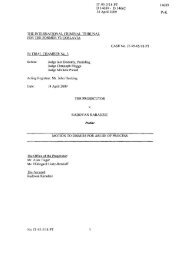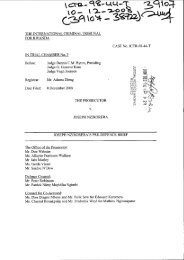Registrar's Response - Peter Robinson
Registrar's Response - Peter Robinson
Registrar's Response - Peter Robinson
Create successful ePaper yourself
Turn your PDF publications into a flip-book with our unique Google optimized e-Paper software.
UNITED<br />
NATIONS<br />
IT-95-5/18-T<br />
78569<br />
D78569 - D78553<br />
21 August 2013 AJ<br />
International Tribunal for the<br />
Prosecution of Persons<br />
Responsible for Serious Violations of<br />
International Humanitarian Law<br />
Committed in the Territory of the<br />
former Yugoslavia since 1991<br />
Case No.: IT-95-5/18-T<br />
Date: 21 August 2013<br />
Original: English<br />
THE PRESIDENT OF THE INTERNATIONAL TRIBUNAL<br />
Before:<br />
Judge Theodor Meron, President<br />
Registrar:<br />
Mr. John Hocking<br />
Submission date: 21 August 2013<br />
THE PROSECUTOR<br />
v.<br />
RADOVAN KARADŽIĆ<br />
PUBLIC<br />
__________________________________________________________<br />
DEPUTY REGISTRAR’S SUBMISSION<br />
REGARDING THE ACCUSED’S REQUEST FOR REVERSAL OF LIMITATIONS OF<br />
CONTACT WITH JOURNALIST: SUDDEUTSCHE ZEITUNG MAGAZIN [sic]<br />
___________________________________________________________<br />
Office of the Prosecutor:<br />
Mr. Alan Tieger<br />
Ms. Hildegard Uertz-Retzlaff<br />
The Accused:<br />
Mr. Radovan Karadžić<br />
Standby counsel<br />
Mr. Richard Harvey
IT-95-5/18-T<br />
78568<br />
INTRODUCTION<br />
1. Pursuant to Rule 33(B) of the Rules of Procedure and Evidence (“Rules”) of the<br />
International Criminal Tribunal for the former Yugoslavia (“Tribunal”), and further to the<br />
accused Radovan Karadžić’s (“Accused”) public “Request for Reversal of Limitations of<br />
Contact with Journalist: Suddeutsche Zeitung Magazin” [sic], filed on 7 August 2013<br />
(“Request for Reversal”), the Deputy Registrar respectfully makes the following<br />
submission.<br />
BACKGROUND<br />
2. On 1 August 2013, the Accused submitted a request to the Registry to be permitted a faceto-face<br />
interview with two reporters of the Süddeutsche Zeitung Magazin, a German print<br />
media (“Request”). Pursuant to the Request, which notably appears to originate from the<br />
reporters rather than the Accused himself, 1 the interview was to cover the Accused’s<br />
biography, daily life, the history of the Balkans, the civil war, and novels written by him.<br />
In support, the Request refers to a TV report by the BBC, filmed in the United Nations<br />
Detention Unit (“UNDU”), which according to the Request had set a “new precedent for<br />
access of serious mainstream media” to detainees at the UNDU. Furthermore, the Request<br />
states that the Süddeutsche Zeitung Magazin would “naturally conduct the interview with<br />
due diligence regarding the ongoing trial, especially security and witness protection”.<br />
Finally, the Request asserts that one of the journalists in question has corresponded with<br />
the Accused before and has been in close contact with the Accused’s Legal Adviser for a<br />
couple of years.<br />
3. By letter of 2 August 2013, the Registrar denied the request (“Impugned Decision”), 2<br />
pursuant to Rule 61(B) of the Rules Governing the Detention of Persons Awaiting Trial or<br />
Appeal before the Tribunal or Otherwise Detained on the Authority of the Tribunal (“Rules<br />
of Detention”), which prohibits face-to-face contact with detainees for the purpose of<br />
obtaining “information which may be subsequently reported in the media”. The Accused<br />
was informed, however, that the Impugned Decision was without prejudice to any further<br />
request for an interview with reporters of the Süddeutsche Zeitung Magazin under an<br />
alternative modality. The Accused was further informed that the BBC visit referred to in<br />
the Request had not included access to detainees nor permission to meet with any detainee,<br />
rather the BBC had been permitted to film an empty part of the UNDU. The Accused was<br />
1 See Annex A to the Request for Reversal.<br />
2 See Annex B to the Request for Reversal.<br />
IT-95-5/18-T 2<br />
21 August 2013
IT-95-5/18-T<br />
78567<br />
informed that the Süddeutsche Zeitung Magazin was welcome to apply for such a visit<br />
through the Tribunal’s Media Office.<br />
4. In the Request for Review, the Accused asks the President to reverse the Impugned<br />
Decision based on an alleged error of the Registrar to consider a face-to-face interview in<br />
the Tribunal’s main building (“Main Building”), which according to the Accused would<br />
not violate Rule 61 of the Rules of Detention.<br />
APPLICABLE LAW<br />
5. The jurisprudence of the Tribunal provides that the judicial review of an administrative<br />
decision by the Registrar is concerned with (1) compliance with the legal requirements of<br />
the applicable rules and regulations; (2) observance of the basic rules of natural justice and<br />
procedural fairness; (3) consideration of relevant material and non-consideration of<br />
irrelevant material, and (4) reasonableness of the conclusion reached. 3<br />
The party<br />
challenging the administrative decision bears the burden of showing that (1) “an error of<br />
the nature described has occurred,” and (2) “such error has significantly affected the<br />
Registrar’s decision to his detriment.” 4<br />
6. The Request for Review was filed pursuant to Rules 61(B) and 64bis(C) of the Rules of<br />
Detention. Pursuant to Rule 61(B):<br />
[t]he Registrar shall refuse to allow a person to visit a detainee if he has reason to<br />
believe that the purpose of the visit is to obtain information which may be<br />
subsequently reported in the media. Rule 64bis(C) shall apply mutatis mutandis to<br />
decision taken by the Registrar under this Sub-Rule.<br />
Rule 64bis(C) provides:<br />
[a] detainee may at any time request the President to reverse a denial of contact made<br />
by the Registrar under this Rule. The President may decide to review the Registrar’s<br />
decision, or if the President determines that the denial of contact constitutes<br />
an infringement on the right of the accused to be tried fairly, refer the request to the<br />
Trial Chamber to determine.<br />
3 Prosecutor v. Kvočka et al., Case No. IT-98-30/1-A, Public, “Decision on Review of Registrar’s Decision to<br />
Withdraw Legal Aid from Zoran Žigić”, dated 7 February 2003 (“Kvočka Decision”), para 13.<br />
4 Kvočka Decision, para. 14.<br />
IT-95-5/18-T 3<br />
21 August 2013
IT-95-5/18-T<br />
78566<br />
ACCUSED’S SUBMISSION<br />
7. The Accused argues that the Registrar erred in failing to consider authorising a face-to-face<br />
interview in the Main Building, which would in his view not violate Rule 61 of the Rules<br />
of Detention. 5 In support of this argument, the Accused refers to the fact that he was<br />
allowed to interview prosecution witnesses prior to their respective testimonies in the<br />
holding cell of the Main Building and that there were several journalists among these<br />
witnesses. 6<br />
8. The Accused further argues that any restrictions of the rights of an accused are subject to<br />
the proportionality principle, and that a detainee’s right to freedom of expression needs to<br />
be balanced against the interests of the prison authorities. 7 With regard to a possible<br />
disclosure of confidential information to the journalists, the Accused states that he has<br />
communicated with journalists on more than 30 occasions and never disclosed any<br />
confidential material. 8 In his view, the Registrar should have considered alternatives to<br />
written correspondence, as “such contact lacks the spontaneity of oral communication and<br />
the ability to follow-up or clarify the answers”. The Accused further suggests that a Court<br />
Officer could sit in on the interview to ensure that no confidential information is disclosed<br />
to the journalist. 9<br />
DEPUTY REGISTRAR’S SUBMISSION<br />
9. It is respectfully submitted that in reaching the Impugned Decision, the Registrar fully<br />
complied with the four-prong standard for proper decision making, as set out in the<br />
Kvočka Decision.<br />
I. The Registrar complied with the applicable legal framework.<br />
10. In considering the Request for Review and issuing the Impugned Decision, the Registrar<br />
applied the Rules of Detention, the relevant jurisprudence of the Tribunal, and the Registry<br />
Protocol for Contacts Between a Detainee and the Media (“Media Protocol”). 10<br />
11. First and foremost, as confirmed by the Vice-President, Rule 61(B) of the Rules of<br />
Detention entails a total ban on face-to-face interviews with journalists. 11 The Vice-<br />
5 Request for Review, para. 6.<br />
6 Request for Review, paras 14-16.<br />
7 Request for Review, para. 19.<br />
8 Request for Review, para. 13.<br />
9 Request for Review, paras. 28, 30.<br />
IT-95-5/18-T 4<br />
21 August 2013
IT-95-5/18-T<br />
78565<br />
President has further repeatedly held that the risk of potential disclosure of confidential<br />
information to a journalist in a direct conversation between a detainee and a journalist -<br />
even if inadvertent - is unacceptable. 12 It is on this basis that the Request was denied.<br />
12. The Accused mistakenly implies that Rule 61(B) of the Rules of Detention applies only to<br />
media interviews at the UNDU and argues that the Registrar should have considered<br />
granting an in-person interview in the Main Building instead. However, the Rules of<br />
Detention, which regulate conditions of detention of the Tribunal’s detainees, are not<br />
location-specific: they apply, mutatis mutandis, to the Main Building, external medical<br />
facilities, or any other premise within the Host Country where a detainee may be<br />
temporarily held. To confine their application only to the UNDU would mean that the<br />
conditions of detention in any other location where detainees might be held on the<br />
Tribunal’s authority would be unregulated, so that detainees, once outside the UNDU,<br />
could, for example, use communication facilities to arrange escape or to intimidate<br />
witnesses, or have free access to contraband. This cannot be the case.<br />
II.<br />
The Registrar observed the basic rules of natural justice and procedural fairness.<br />
13. The Registrar observed the basic rules of natural justice and procedural fairness by<br />
considering the Request despite the fact that it was seemingly completed by the journalists<br />
and not by the Accused as required under the Media Protocol. 13 The Registrar further<br />
considered alternative modalities for the Accused’s contact with the Süddeutsche Zeitung<br />
Magazin (the Registrar invited the Accused to carry out a written interview with the<br />
Süddeutsche Zeitung Magazin, in accordance with the Media Protocol) and invited the<br />
journalists to apply for a visit to an unoccupied area of the UNDU, in line with their<br />
implied interest in visiting the detention facility. The Accused and the journalists chose not<br />
to take advantage of these offers.<br />
10 With regard to the Media Protocol, see Annex, “Procedure for Contacts With the Media- Information for Detainees”.<br />
11 See Prosecutor v. Radovan Karadžić, Decision on Radovan Karadžić’s Request for Reversal of Denial of Contact<br />
with Journalist, dated 12 February 2009 (“First Karadžić Media Decision”), para. 16: “[…] Rule 61 of the Rules of<br />
Detention imposes a total ban on face to face visits between detainees and journalists.”<br />
12 Id., para. 21: “[…] I note another important consideration with respect to the administration of justice is the potential<br />
for confidential information to be disclosed. […] Allowing [this] is obviously unacceptable.” Prosecutor v Radovan<br />
Karadžić, Decision for Reversal of Limitations of Contact with Journalists dated 21 April 2009 (“Second Karadžić<br />
Media Decision”), para. 21; see also Decision for Reversal of Limitations of Contact with Journalist: Russia Today,<br />
dated 6 November 2009 (“Third Karadžić Media Decision”), para.29: “It has previously been established that a live<br />
audio or visual recording is not permissible due to concerns related to the administration of justice, notably the risk of<br />
(inadvertent) disclosure of confidential information.”<br />
13 In the Impugned Decision the Accused was reminded that whilst the Registrar appreciates that the Accused may<br />
support a request submitted by a media outlet, he must complete any further request personally in line with the Media<br />
Protocol. This provides certainty as to the Accused’s reasons for requesting the contact with the media, and accordingly<br />
assists in the decision making process.<br />
IT-95-5/18-T 5<br />
21 August 2013
IT-95-5/18-T<br />
78564<br />
III.<br />
The Registrar considered only relevant material and did not consider irrelevant material.<br />
14. In reaching the Impugned Decision, the Registrar only considered relevant material, such<br />
as the Rules of Detention, the Media Protocol, and the jurisprudence of the Tribunal. In<br />
this regard, the Accused’s reference to the proofing sessions he held at the Main Building<br />
with prosecution witnesses who were journalists is misleading and irrelevant. The purpose<br />
of these interviews was not to obtain information to be reported in the media (which is the<br />
reason for the prohibition of in-person interviews with journalists under Rule 61(B) of the<br />
Rules of Detention). Rather, the Accused was authorised to interview the journalists<br />
regarding their upcoming testimonies in order to facilitate his participation in the<br />
proceedings as a self-represented accused. Each witness-journalist so interviewed signed a<br />
specific non-disclosure undertaking which acknowledged that the sole purpose of the<br />
interview was to discuss issues relevant to the case brought against the Accused before the<br />
Tribunal. 14<br />
IV.<br />
The Impugned Decision is reasonable and proportionate.<br />
15. The Impugned Decision is reasonable and proportionate, and the Accused fails to show<br />
that the Impugned Decision was detrimental to him. In particular, the Impugned Decision<br />
does not affect the Accused’s ability to be interviewed by Süddeutsche Zeitung Magazin<br />
and hence exercise his right to freedom of expression.<br />
16. The Tribunal’s jurisprudence is clear: the restriction of detainees’ contact with the media to<br />
written interviews is proportionate and protects the detainees’ right to freedom of<br />
expression while keeping the risk of disclosure of confidential information to a<br />
minimum. 15 Written correspondence between the Accused and journalists can be<br />
thoroughly reviewed by Registry staff to ensure that no sensitive information is revealed<br />
therein. Unlike face-to-face interviews, written correspondence allows the Registry to<br />
verify information provided by the Accused and consult the Chamber, where necessary on<br />
sensitive matters.<br />
17. In contrast, the Accused’s suggestion to have a Court Officer sit in on a live interview<br />
would not provide sufficient protection against the risk of disclosure of confidential<br />
information. In the first place, this would provide no protection against disclosure to the<br />
14 That one of the respective journalists subsequently published an article in which he describes the witness proofing<br />
session with the Accused and his subsequent testimony does not alter the reason for authorisation of the meeting.<br />
Whether the journalist violated the non-disclosure undertaking he signed before the interview is a separate matter which<br />
is currently under examination by the Registry.<br />
15 See Second Karadžić Media Decision, para. 21.<br />
IT-95-5/18-T 6<br />
21 August 2013
IT-95-5/18-T<br />
78563<br />
journalists themselves. In addition, Court Officers do not have knowledge of all the<br />
confidential records and information available in a voluminous case such as that of<br />
Karadžić, and their responsibilities, unlike those of the Chamber and the parties, are not<br />
related to substantive issues of law and fact. They cannot therefore be relied upon to judge<br />
whether confidential information has been disclosed without further consultation. For the<br />
same reasons, other Registry staff members are similarly unsuited to assume this proposed<br />
role.<br />
18. The Accused has not explained why providing that his interview should take written form<br />
violates his freedom of expression, particularly given that the Süddeutsche Zeitung<br />
Magazin is a print media. His argument that a written interview is “less spontaneous and<br />
does not leave room for clarifications” is not convincing and has been unsuccessfully<br />
raised by the Accused before. 16 Indeed, it appears to represent the interests of the<br />
journalists, who submitted the original request, rather than of the Accused himself. While<br />
the reporters and the Accused may prefer to meet in person, the Accused is not dependent<br />
on a face-to-face interview to exercise his freedom of expression.<br />
19. In this regard, the Registrar respectfully recalls the Acting President’s finding that “the<br />
preference of a particular broadcast media regarding the format of the information received<br />
cannot define or qualify a detainee’s right to freedom of expression.” 17 The Acting<br />
President further held that while a detainee is generally allowed to communicate with the<br />
media, this right does not comprise the form in which such communication takes place. 18<br />
The specification that communications between the Accused and the Süddeutsche Zeitung<br />
Magazin shall be carried out in writing does not violate the Accused’s freedom of speech<br />
for he remains free to communicate his messages to the media according to the procedure<br />
set out in the Media Protocol.<br />
20. Finally, experience has shown written correspondence to be conducive to effective<br />
communication. In the conduct of over 30 written interviews of the Accused authorised<br />
and facilitated by the Registry so far, not once has a journalist written back to request<br />
clarification of any issue. 19 However, the Registry remains available to facilitate follow up<br />
questions in the future, where reasonably necessary.<br />
16 See Second Karadžić Media Decision.<br />
17 Third Karadžić Media Decision, para. 29.<br />
18 Ibid.<br />
19 Importantly, however, there were several instances in which the Registry had to return the Accused’s answers to the<br />
Accused for reformulation, in order to ensure that no confidential information was disclosed or no contentious issues<br />
sub iudice were discussed.<br />
IT-95-5/18-T 7<br />
21 August 2013
IT-95-5/18-T<br />
78562<br />
CONCLUSION<br />
21. The Registrar submits that the Impugned Decision is entirely within the framework of the<br />
Kvočka test for proper administrative decision making. More specifically: (1) the Registrar<br />
complied with the relevant legal requirements, in particular Rule 61(B) of the Rules of<br />
Detention; (2) the Registrar observed the basic rules of natural justice and procedural<br />
fairness by giving the request reasoned consideration and by offering alternative means to<br />
ensure the Accused can exercise his right to freedom of expression; (3) the Registrar<br />
considered only relevant material and disregarded irrelevant material; and (4) the<br />
Registrar’s conclusion is proportionate and reasonable in the context of the Rules of<br />
Detention and the jurisprudence of the Tribunal, and specifically in this case does not<br />
violate the Accused’s Freedom of Expression.<br />
22. As the Accused has failed to meet the burden of showing the contrary, the Registrar<br />
respectfully submits that the Request for Review should be dismissed.<br />
23. The Registrar remains available to provide any additional information, at the President’s<br />
discretion.<br />
Respectfully submitted,<br />
Dated this 21st day August 2013<br />
At The Hague,<br />
The Netherlands.<br />
Kate Mackintosh<br />
Deputy Registrar<br />
IT-95-5/18-T 8<br />
21 August 2013
IT-95-5/18-T<br />
78561<br />
______________________________________________________<br />
ANNEX<br />
_______________________________________________________<br />
IT-95-5/18-T 9<br />
21 August 2013
IT-95-5/18-T<br />
78560<br />
27 July 2009<br />
United Nations<br />
Nations Unies<br />
International<br />
Criminal Tribunal<br />
for the former<br />
Yugoslavia<br />
Registry<br />
Tribunal Pénal<br />
International pour<br />
l’ex-Yougoslavie<br />
Greffe<br />
PROCEDURE FOR CONTACTS WITH THE MEDIA – INFORMATION FOR<br />
DETAINEES<br />
Introduction<br />
The purpose of this paper is to set out the procedure for the contacts between a detainee<br />
and the media, pursuant to Rule 64bis(A) of the Rules Governing the Detention of<br />
Persons Awaiting Trial or Appeal before the Tribunal or Otherwise Detained on the<br />
Authority of the Tribunal (“Rules of Detention”) of the International Criminal Tribunal<br />
for the former Yugoslavia. 1<br />
Submission of Requests<br />
A detainee who wishes to contact the media shall submit a written request to this effect<br />
(“Request”) to the Registrar through the UNDU Commanding Officer. The detainee<br />
shall provide details about the requested contact with the media through the completion<br />
of the ‘Request for Media Contact’ attached herewith as Annex A. The detainee shall<br />
provide, as an attachment to the Request, any relevant documentation, such as<br />
correspondence between the detainee and the media on the matter.<br />
Correspondence from the Media<br />
A media agency or a media representative seeking contact with a detainee for the<br />
purposes of media reporting must first approach the detainee with its reporting<br />
proposal. If the detainee consents to the reporting proposal, based on the<br />
correspondence he received from the media representative, and wishes to seek the<br />
Registrar’s approval, the detainee must submit a ‘Request for Media Contact’ attached<br />
as Annex A to this Protocol to the UNDU, attaching the correspondence from the media<br />
agency or representative.<br />
Registrar’s Decision<br />
The contact with the media shall take place only if granted by the Registrar.<br />
Face-to-face contacts are not allowed. 2<br />
Other forms of contacts with the media may be granted, unless the Registrar has reasons<br />
to believe that the particular contact requested could disturb the good order of the<br />
UNDU or could interfere with the administration of justice; or otherwise undermine the<br />
Tribunal’s mandate in accordance with Rule 64bis of the Rules of Detention.<br />
A copy of the Registrar’s decision shall be communicated to both the detainee and the<br />
media representative, where relevant.<br />
1 Rules Governing the Detention of Persons Awaiting Trial or Appeal before the Tribunal or Otherwise<br />
Detained on the Authority of the Tribunal, IT/38/Rev. 9.<br />
2 Rule 61(B) of the Rules of Detention; See also IT-95-5/18-PT, Prosecutor v. Radovan Karadži, Decision on<br />
Radovan Karadži’s Request for Reversal of Denial of Contact with Journalist, 12 February 2009<br />
(“Decision”), para. 16.<br />
Churchillplein 1, 2517 JW The Hague. P.O. Box 13888, 2501 EW The Hague. Netherlands<br />
Churchillplein 1, 2517 JW La Haye. B.P. 13888, 2501 EW La Haye. Pays-Bas
IT-95-5/18-T<br />
78559<br />
Contact Granted<br />
In the event that the detainee’s Request is granted, the decision will enumerate practical<br />
arrangements such as the format in which the contact is to take place, languages to be used,<br />
the maximum length of the interview if taking place over the telephone, the media outlet in<br />
which the piece is to appear, etc.<br />
Further, both the detainee and the media representative will be required to sign the<br />
undertakings attached herewith as Annex B. By signing the undertaking, the detainee and the<br />
media representative acknowledge that they are aware of the conditions under which the<br />
contact is granted, and that a departure from these conditions may result in the imposition of<br />
sanctions and, where appropriate, the initiation of contempt proceedings under Rule 77 of<br />
the Rules of Procedure and Evidence of the Tribunal. 3<br />
Additionally, the detainee will be informed of the fact that his contact with the media will be<br />
monitored. 4<br />
Upon the issuance of a decision granting the contact, necessary arrangements will be<br />
undertaken by the Registry in order to facilitate the contact.<br />
The decision of the Registrar granting contact will be immediately revoked should the<br />
detainee and/or the media representative refuse to sign the undertaking.<br />
Contact Denied<br />
In the event that the detainee’s Request to contact the media is denied, the Registrar shall<br />
explain the reason(s) for denial and inform the detainee of his right to seek review of the<br />
decision by the President of the Tribunal. 5<br />
3 Decision, para. 24(c).<br />
4 Decision, para. 24(b); Regulations 1 to 28 of the United Nations Detention Unit Regulations to Govern<br />
Supervision of Visits to and Communication with Detainees shall apply mutatis mutandis.<br />
5 In accordance with the Rules of Detention, a detainee may request review of any such decision pursuant to the<br />
Complaints Procedure.
IT-95-5/18-T<br />
78558<br />
ANNEX A
IT-95-5/18-T<br />
78557<br />
REQUEST FOR MEDIA CONTACT<br />
Case name and number:<br />
Name of the Detainee<br />
submitting the Request:<br />
Detailed reasons for the<br />
Request (attach a separate<br />
sheet if necessary):<br />
Information regarding the<br />
Media Agency/Media<br />
Representative with whom<br />
contact is sought (please<br />
attach any correspondence<br />
received from the Media<br />
Agency or<br />
Representative):<br />
Name of the Media<br />
Agency:<br />
Full name of Media<br />
Representative:<br />
Professional Title:<br />
Contact information<br />
for Media Agency<br />
and/or Representative<br />
(address, telephone,<br />
email, website):<br />
Proposed topic(s) to be<br />
discussed with Media<br />
Agency/Media<br />
Representative (attach a<br />
separate sheet if<br />
necessary):
IT-95-5/18-T<br />
78556<br />
Information regarding the<br />
proposed publication:<br />
Type of media<br />
through which the<br />
reporting is to take<br />
place (e.g. television,<br />
radio, magazine,<br />
internet):<br />
Name of publication<br />
or station/channel and<br />
programme, or<br />
website:<br />
Projected publication<br />
or broadcast date:<br />
Requested form of contact<br />
(via written<br />
correspondence, telephone<br />
call, other):<br />
Other relevant<br />
information:<br />
Date of the Request:<br />
Signature of the Detainee:<br />
To be filled in by UNDU<br />
Request #: ___________________ Received on: __________________ Received by: __________________<br />
Approved or Rejected:
IT-95-5/18-T<br />
78555<br />
ANNEX B
IT-95-5/18-T<br />
78554<br />
UNDERTAKING<br />
For Detainee<br />
1) I, ___________________________________________________________________,<br />
(Name of detainee)<br />
understand that I have been authorised to contact<br />
______________________________________________________________________<br />
(Name of media representative and media organisation)<br />
(“Media Representative”) by way of ________________________________________<br />
(Specify the modalities)<br />
in accordance with Rule 64bis(A) of the Rules Governing the Detention of Persons<br />
Awaiting Trial or Appeal before the Tribunal or Otherwise Detained on the Authority of<br />
the Tribunal of the International Criminal Tribunal for the former Yugoslavia (“ICTY”).<br />
2) During my contact with the Media Representative, I undertake not to address any issues<br />
that:<br />
a) would amount to a disclosure of confidential information;<br />
b) may have the effect of influencing or interfering with present or prospective<br />
witnesses before the ICTY; or<br />
c) may have the effect of disturbing the good order of the UNDU, interfering with the<br />
administration of justice or otherwise undermining the Tribunal’s mandate<br />
3) I further undertake not to make or comment upon false or defamatory statements about<br />
ICTY Judges and staff members or statements regarding Judges and staff members outside<br />
their official capacity; any statement containing obscene or otherwise offensive language;<br />
statements aiming to influence the Judges or staff members of the ICTY or the outcome of the<br />
proceedings.<br />
4) I understand and accept that I shall not disclose in any form:<br />
a) The layout, configuration or physical description of the United Nations Detention<br />
Unit (“UNDU”), including the locations of detainees within the UNDU; or<br />
b) Any other information relating to the UNDU or any other detainee which is not in<br />
the public domain.
IT-95-5/18-T<br />
78553<br />
5) I undertake to fully comply with the conditions for the contact, as set out in the<br />
Registrar’s decision.<br />
I acknowledge that any breach of this undertaking may lead to the imposition of sanctions such<br />
as, but not limited to, restrictions of my right to contact with the media and/or the instigation of<br />
contempt proceedings against me under Rule 77 of the Rules of Procedure and Evidence where<br />
applicable.<br />
Signature: ______________________<br />
Done this ________________ day of _____________________<br />
(Day)<br />
(Month, year)<br />
At The Hague,<br />
The Netherlands.



